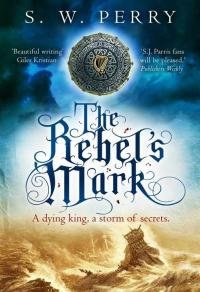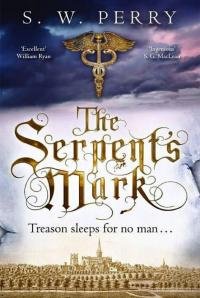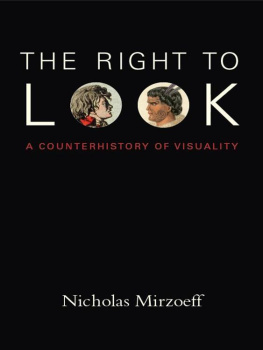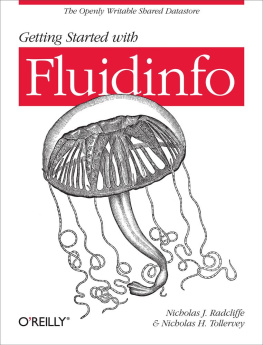S. W. Perry
THE SARACENS MARK
2020
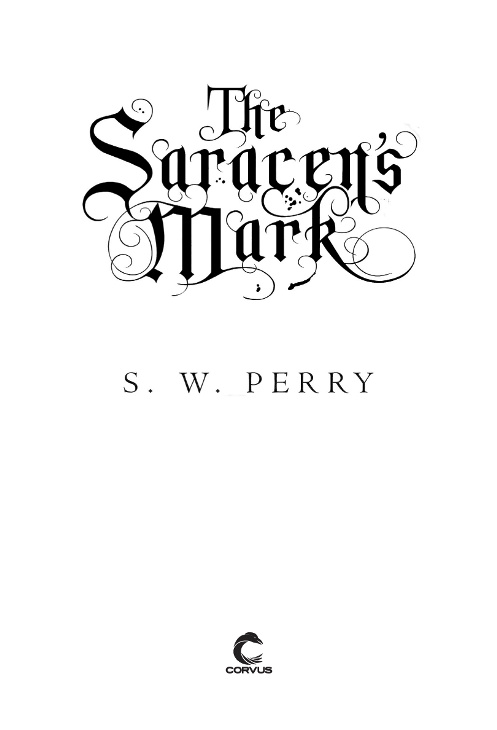
O, let the heavens give him defence against the elements, for I have lost him on a dangerous sea
WILLIAM SHAKESPEARE, OTHELLO
In 1589 the Sultan of Morocco sent an envoy to London. He received a rapturous welcome, even though at the time comprehension of the mysterious Islamic world was, at best, confused. Whatever the country of his birth, to the English a Muslim was a Moor, a Turk, or a Saracen
PART 1

The Kissing Knot
Marrakech, Morocco. March 1593
In the moment before they caught him, Adolfo Sykes was dreaming of oranges.
It was an hour after sunset, the third night of the time that some amongst the Moors called `Ushar, when the moon was almost full. In the gardens of the Koutoubia mosque the sellers of holy texts had packed away their books. The professional storytellers had departed, their audiences dispersed. From their high minarets the muezzins had called the city to the al-maghrib prayers, leaving the medina to the shadows and the scavenging dogs.
He loved the city at this time of night. He felt enfolded within its protective red walls. The cooling breeze from the Atlas Mountains filled the streets not with the scents of spices and human sweat, but with cleansing citrus.
Until hed come to the land of the Moor, Adolfo Sykes had barely seen an orange, let alone tasted the succulent flesh. But now, after three prosperous years in Morocco, this agent of the Barbary Company of London its founding stockholders the noble Earls of Warwick and Leicester was ready to believe that paradise itself might smell like one vast orchard of orange trees.
He had almost reached his destination, the city hospital, the Bimaristan al-Mansur. Its high mud-brick walls were barely twenty paces ahead of him. And then this agreeable reverie was shattered in a single heartbeat.
Out of the night stepped two figures, their heads bound in voluminous kufiyas a pair of monstrously fat-headed demons conjured up by some devilish jinn. In that instant Adolfo Sykes realized he had been a dead man from the moment hed left his lodgings on the Street of the Weavers.
He had thought himself unobserved, no easy accomplishment for a small, somewhat bow-legged half-English, half-Portuguese merchant with a threadbare curtain of prematurely white hair that clung to the sides of his otherwise-unsown pate. An involuntary grunt of surprise escaped his lips. He stopped. Then he did what most are inclined to do when they have stumbled into what they suspect to be mortal danger: he came up with hasty reasons to believe he hadnt.
They are fellow Christian traders, he told himself confidently. Or Jewish moneymen from the el-Mellah quarter, those clever fellows without whom trade between Moor and European would seize up like an axle without grease. Whoever they were, they were not, under any circumstances, real or imagined, assassins.
The night suddenly seemed colder, despite the djellaba he was wearing, woven from the best English wool, and evidence if any were needed of the superiority of his merchandise. Fighting against a rising tide of panic, Sykes glanced quickly over his shoulder. A second pair of shrouded figures was standing barely two paces behind him, cutting off his retreat.
What happened next began with a moment of awkward comedy. First there was an odd little dance, as though five latecomers to a feast had all converged at the one remaining empty chair. Sykes, being a diminutive fellow and as wiry as a Barbary macaque, dodged sideways. He had a brief glimpse of himself as a free man, speeding through the darkened streets to safety then to a ship that would carry him back to England where, as far as he knew, no one intended him violent bodily harm. Then a grasping hand caught a fold of his djellaba and a sideways kick swept his little bowed legs from under him. He went face-down onto the dirt, a plaintive grunt bursting from his lungs. He felt warm blood pool in his jaw, and the weight of a mans knee in the small of his back, almost breaking him. The darkness took on an even thicker patina as the man leaned over him, enveloping him in the folds of his robe like a falcon mantling over a stunned hare.
Even then, Adolfo Sykes was not yet fully ready to acknowledge the truth: that they had known he was coming, known where to lie in wait. That hed been driven like game, the way the Berber tribesmen drove the desert gazelle towards their bows. In his tolerable Arabic he gasped, Purse left side my belt take it. If God wills it, its yours.
The answer ripped away the last shreds of self-delusion.
Do not insult us, Master Sykes; we are not common thieves, said a voice very close to his left ear. It is not your purse we desire; it is the secret that you keep hidden from us in your infidel heart.
English. Spoken with an Irish accent, by someone barely grown to manhood. The very last language hed been expecting to hear.
Turning his head painfully towards the speaker, Sykes saw a cheek as pale as porcelain in the moonlight, a cheek flecked with a boyish attempt at a beard.
The voice then spoke some words in Arabic, presumably for his companions benefit. It was not the unrefined language of the streets, Sykes noticed abstractly, but formal, classical Arabic, as if it had recently been learned by rote at the feet of a teacher. Sykes picked out the phrases It is him its the infidel who steals from the faithful.
This offended Adolfo Sykes almost as much as the assault on his body. He had never stolen from anyone. Ask his customers. Ask the Christian merchants. Ask the Jews from the el-Mellah. Ask the forty God-fearing English merchants who comprised the body of the Barbary Company licensed by the queens seal to hold the monopoly of trade between the princely states of Morocco and England fine upstanding men, every last one of them. Men who counted themselves amongst the most forward-thinking in London, and who would expel him at the merest suggestion of stealing.
But what troubled him more than the slander was the voice: an executioners voice, devoid of mercy.
Rough hands hauled Sykes to his feet. Making a poor attempt at bluff, he protested, I am the factor for the Barbary Company of London. As such, I am protected by the mercy of His Majesty Sultan al-Mansur. I have his written word upon it. I can show you.
And it was true, after a fashion. The passport was in his lodgings, penned by one of the sultans army of clerks, though as it was written in Arabic which he could speak, but not read it might, for all Sykes knew, be a shopping list.
The answer was brutally unapologetic. First there was a blow to the side of his head that made his knees buckle. Then they bound his hands and gagged him. He could tell at first bite that the gag was of a wholly inferior-quality cloth. Probably homespun by Berber tribesmen. It seemed to Sykes like the final, deliberate insult.

They manhandled him roughly through the same narrow doorway cut into the mud-brick wall of the Bimaristan from which they had emerged. He didnt struggle. They were young and much too strong for him. They had the law of the desert on their side: the weak always die first; and resisting only prolongs the agony.
Once inside, Sykes saw by the meagre light of an oil lamp an old watchman sitting in an alcove. His furrowed skin was as dark as


